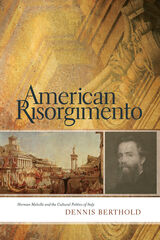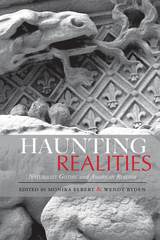2 books by Berthold, Dennis

American Risorgimento
Herman Melville and the Cultural Politics of Italy
Dennis Berthold
The Ohio State University Press
Although Herman Melville is typically considered one of America’s earliest cosmopolitan writers, scholarship has focused primarily on his involvement with the South Seas, England, and the Holy Land. In American Risorgimento: Herman Melville and the Cultural Politics of Italy, Dennis Berthold extends Melville’s transnational vision both geographically and historically by examining his many references to Italy and Rome in the context of the Risorgimento, Italy’s long quest for independence and political unity.
Melville’s contemporaries, notably Margaret Fuller and Henry T. Tuckerman, recognized the similarities between the Risorgimento and America’s struggle for national identity, and the influx of exiles from the failed Italian revolutions of 1820 and 1831 made Melville’s New York a hotbed of Risorgimento sympathies. Literary and political expostulations on Italy’s plight combined to create a distinctively American view of the Risorgimento that Melville elaborated in his fiction through allusions, characterizations, and direct commentary on Roman history, Dante, Machiavelli, Pope Pius IX, and Giuseppe Mazzini.
Melville followed the unfolding drama of Italian nationalism more closely than any other major American writer and found in it tropes and themes that fueled his turn to poetry, particularly after his visit to Italy in 1857. The Civil War, a crisis for American nationalism as urgent and profound as the Risorgimento, reinforced the symbolic parallels between the United States and Italy and led Melville to meditate on Giuseppe Garibaldi and other Italian patriots in one of his longest poems.
Melville’s literary appropriations of Italian history, art, and politics demonstrate that transnational cultural exchanges are not confined to later American writing but originate with the country’s earliest authors and their recognition that any national literature worthy of the name must incorporate a broad international frame of reference.
Dennis Berthold is professor of English at Texas A&M University, College Station.
[more]

Haunting Realities
Naturalist Gothic and American Realism
Edited by Monika Elbert and Wendy Ryden
University of Alabama Press, 2017
An innovative collection of essays examining the sometimes paradoxical alignment of Realism and Naturalism with the Gothic in American literature to highlight their shared qualities
Following the golden age of British Gothic in the late eighteenth century, the American Gothic’s pinnacle is often recognized as having taken place during the decades of American Romanticism. However, Haunting Realities explores the period of American Realism—the end of the nineteenth century—to discover evidence of fertile ground for another age of Gothic proliferation.
At first glance, “Naturalist Gothic” seems to be a contradiction in terms. While the Gothic is known for its sensational effects, with its emphasis on horror and the supernatural, the doctrines of late nineteenth-century Naturalism attempted to move away from the aesthetics of sentimentality and stressed sobering, mechanistic views of reality steeped in scientific thought and the determinism of market values and biology. Nonetheless, what binds Gothicism and Naturalism together is a vision of shared pessimism and the perception of a fearful, lingering presence that ominously haunts an impending modernity. Indeed, it seems that in many Naturalist works reality is so horrific that it can only be depicted through Gothic tropes that prefigure the alienation and despair of modernism.
In recent years, research on the Gothic has flourished, yet there has been no extensive study of the links between the Gothic and Naturalism, particularly those which stem from the early American Realist tradition. Haunting Realities is a timely volume that addresses this gap and is an important addition to scholarly work on both the Gothic and Naturalism in the American literary tradition.
Following the golden age of British Gothic in the late eighteenth century, the American Gothic’s pinnacle is often recognized as having taken place during the decades of American Romanticism. However, Haunting Realities explores the period of American Realism—the end of the nineteenth century—to discover evidence of fertile ground for another age of Gothic proliferation.
At first glance, “Naturalist Gothic” seems to be a contradiction in terms. While the Gothic is known for its sensational effects, with its emphasis on horror and the supernatural, the doctrines of late nineteenth-century Naturalism attempted to move away from the aesthetics of sentimentality and stressed sobering, mechanistic views of reality steeped in scientific thought and the determinism of market values and biology. Nonetheless, what binds Gothicism and Naturalism together is a vision of shared pessimism and the perception of a fearful, lingering presence that ominously haunts an impending modernity. Indeed, it seems that in many Naturalist works reality is so horrific that it can only be depicted through Gothic tropes that prefigure the alienation and despair of modernism.
In recent years, research on the Gothic has flourished, yet there has been no extensive study of the links between the Gothic and Naturalism, particularly those which stem from the early American Realist tradition. Haunting Realities is a timely volume that addresses this gap and is an important addition to scholarly work on both the Gothic and Naturalism in the American literary tradition.
[more]
READERS
Browse our collection.
PUBLISHERS
See BiblioVault's publisher services.
STUDENT SERVICES
Files for college accessibility offices.
UChicago Accessibility Resources
home | accessibility | search | about | contact us
BiblioVault ® 2001 - 2024
The University of Chicago Press









